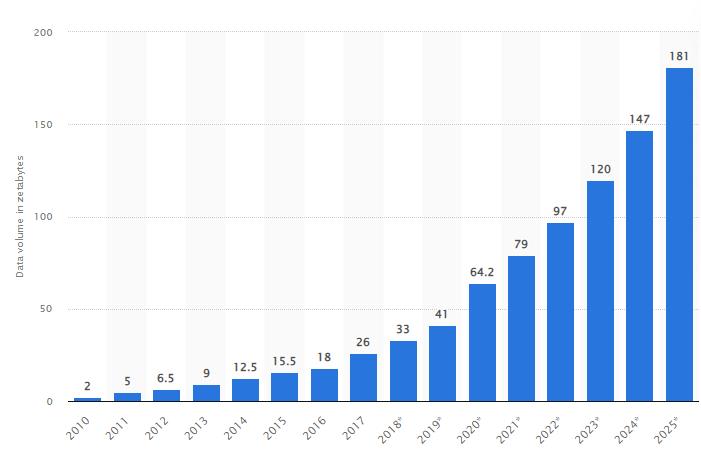Filecoin Storage Up 128% This Quarter
The decentralized file storage sector is growing rapidly.
By: Jason Levin • Loading...
DeFi
We live in the age of data.
Whether it’s backing up our cell phones and photos or corporations storing their records, our appetite for storage continues to grow, with global data storage predicted to hit 181 ZB (zettabytes or 1021 bytes) by 2025.

Global Data Storage. Source: Statista
While web2 behemoths like Amazon’s AWS and Microsoft’s Azure dominate the industry, there is a subtly growing sub-industry focused on decentralized data storage.
Centralized storage providers like AWS store data on internal servers, implying that users’ access to their data can be cut off by the hosting company if it chooses to do so. This could happen for various reasons such as non-payment, violation of ToS etc.
Decentralized Storage
In contrast, decentralized storage providers like Filecoin store data on a distributed network of thousands of nodes across the globe. According to Messari analyst Sami Kassab, Filecoin increased its storage last quarter by 128% to 16.87 EiB (exbibytes or 260 bytes).
Filecoin is a project that was founded by Protocol Labs and raised $258.2M largely through a 2017 ICO. It launched on Ethereum mainnet in October 2020, and currently has a market cap of $2B.
Like centralized storage, Filecoin’s decentralized cloud storage can be used to store any type of data. Instead of users paying centralized providers, they are paying storage providers across the globe. Storage providers, or nodes, earn the network’s native FIL token. The company has already partnered with companies like Wikipedia, The Genome Aggregation Database (gnomAD), and online library Project Gutenberg.
This is not just a case of decentralization fever. “For crypto protocols to flourish trustlessly and securely, decentralized storage is a fundamental infrastructure layer that is needed,” Kassab told The Defiant. He explained that most blockchains aren’t optimized for storing large amounts of data, so it makes sense to store it on a chain like Filecoin.
“Without decentralized storage protocols, users and devs would have to rely on large centralized storage providers, which goes against the ethos of the space, which includes censorship-resistant systems and self-sovereign data,” he continued.
Cheaper Option
Not only does decentralized storage support the crypto ethos, it’s cheap!
Storing data on a decentralized storage platform can cost a fraction of the price of a centralized storage provider. While it can cost upwards of $75 to store 1 GB of data on AWS or Google for one year, it’s nearly free on Filecoin.
Because of this cheap pricing to attract users, Filecoin has grown in data storage, but its protocol revenue has remained flat. Independent crypto analyst Hunter Lampson told The Defiant that Filecoin frequently subsidizes the block reward to offer storage for free to large partners. Like many emerging industries, VC money is fueling the fire more than actual demand-side revenue.
While this sounds troubling, Kassab told The Defiant that “data storage is only step 1 in Filecoin’s roadmap.” He explained that Filecoin will be adding smart contract capability which will allow programmable apps on Filecoin. “It looks like Filecoin is essentially trying to establish itself as the AWS of the crypto world.”
By adding more services to the protocol, Kassab believes this will leverage Filecoin’s network of storage providers and add additional revenue streams to providers and the protocol.
Advertisement
Get the best of The Defiant directly in your inbox 💌
Know what matters in Web3 with The Defiant Daily newsletter, every weekday
90k+ investors informed every day. Unsubscribe anytime.